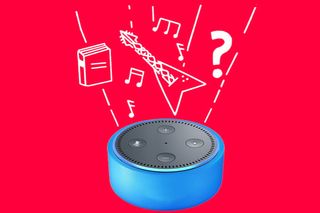
Amazon’s Echo Dot Kids Is Launching to a Chorus of Concerns
Is the smart home device a smart choice for families?

Amazon has announced it will be launching Echo Dot Kids Edition, a kid-friendly version of its Alexa-run smart speaker. For sale next week, it’s the latest in high-profile kid-friendly tech following the launch of Facebook’s Messenger Kids earlier this year. And it comes with the same problems.
Echo Dot Kids has clearly had some thought put into it (aided, no doubt, by videos chronicling the perils of having Alexa in a home with children). It rewards kids for accompanying their requests with a ‘please,’ redirects kids to parents for answers to questions like “Where do babies come from,” and allows parents to set time limits, bedtimes, review activity, set parental controls, and prevent purchases. It also, of course, comes with a year’s subscription (just long enough to get hooked) to Amazon’s Free Time Unlimited, which, per Consumer Reports, “includes access to Audible children’s books, kids’ songs on Amazon Music, and games and apps (known as ‘skills’) from outlets such as Disney, National Geographic, and Nickelodeon.”
The launch raises a few important concerns. The rebranding of entertainment as skills without any acknowledged advising from a child development expert to validate the claim is, perhaps, the most obvious place to start. The second point is that parental controls are a less-than-effective way of protecting children online.
But of greater concern is that Echo Dot Kids Edition will collect children’s data, including “name, birthdate, contact information (including phone numbers and e-mail addresses), voice, photos, videos, location, certain activity and device information,” per the company’s Children’s Privacy Disclosure, which also notes the ‘skills’ and other apps hosted by the device are not bound by the same guidelines.
There are two risks to Amazon’s collection of children’s data, notes Allen St. John for Consumer Reports: The long-debated, ethically dubious area of collecting data on children at all, and identity theft, which children are particularly vulnerable to and which is made easier when corporations hold individuals’ personal information. Elsewhere, the ease with which an Alexa device can be hacked and turned into a listening device has been demonstrated repeatedly.
Amazon insists the data it collects is only to improve the functioning and offering of the device, and that parents can delete cloud recordings of children’s requests from the company’s servers.
The question is — how many of us will? If the purpose of a smart home device is to make life easier, requiring parents who want to protect their children’s privacy to jump through the hoop of deleting recordings of their children’s voices accomplishes the opposite of that. Amazon’s efforts are praiseworthy (albeit against a fairly low bar) but its concern for children’s privacy would be more believable if those recordings and that data weren’t retained in the first place. There are other ways to get the information needed to improve the device, though none of them so easy and efficient. But families shouldn’t have to pay in privacy for Amazon’s faster refinement of product.
The one good thing about the Echo Dot Kids Edition, perhaps, is that its launch elevates the discussion of screen time to a conversation about device use. Though Echo Dot Kids Edition has no screen, it comes with the same concerns.
“Parents must consider whether their children are helped or harmed by this form of constant connectivity and weigh the benefits offered by this new technology against the potential privacy concerns these devices continue to present,” says Stacey Steinberg, a child privacy expert and professor at the University of Florida Levin College of Law, told St. James.
There’s no doubt smart home devices are in all of our futures, including our kids’. One preview of the product sums it up perfectly: “Amazon Hopes Parents Will Trust Its New Gadgets — And We Probably Will.” The question is, is it smart to?
Related:
Liesl Goecker is The Swaddle's managing editor.
Related


Losing Control in the Digital Age
